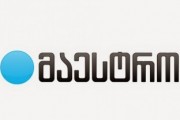NEWS

On September 15, 2015, during the visit of Prime Minister in Ozurgeti, members of the United National Movement (UNM) hung up a fabric banner on façade of one of the buildings in Ozurgeti bearing words “Government is a liar”. This was followed by immediate arrest of UNM members Davit Mzhavanadze and Ilia Malazonia, as well as a member of NGO Free Zone, Beso Katamadze by Ozurgeti Police under para.2, Article 150 of the Code of Administrative Offences – Making various types of inscriptions, drawings or symbols on building facades, shop windows, fences, columns, trees or other plantings without authorization, also putting up placards, slogans, banners at places not allocated for this purpose, or leaving fences and buildings unpainted, committed repeatedly, which carries a fine of 500 laris. Authorities drew up corresponding protocol of administrative offence but the detainees allege that they never received a copy of the document.
The same day Maestro TV reporter Irakli Vachiberidze asked Prime Minister Irakli Gharibashvili to comment on the detention of members of the UNM and Free Zone but Chief of Guria Police Koba Tsertsvadze allegedly disrupted his inquiry and threatened him.
The Ministry of Internal Affairs of Georgia released a statement about the incident, saying: “although all media outlets and reporters were free to cover today’s events in Ozurgeti without, the General Inspection of the Ministry is willing to launch a probe into the contention of Maestro TV reporter and take further actions if an infraction is detected.”
Below please find GYLA’s legal assessment of the developments in Ozurgeti
Threats against a reporter
Irakli Vachiberidze’s contention that Koba Tsertsvadze forced him away and disrupted his inquiry may amount to illegal interference in journalistic reporting. In addition, the reporter alleges that Koba Tsertsvadze threatened to “remove” and “evaporate” him, which is also a crime.
The MIA was quick to dismiss allegations about crime against the reporter by releasing a statement, without performing any examination or investigation, which calls the Ministry’s objectivity into question. In addition, because the case involves alleged crime by MIA official as opposed to an infraction (as stated by the MIA in its official statement), it must be investigated by the prosecution service. Otherwise, examination by the MIA General Inspection will delay effective further actions and hinder timely and effective investigation.
We urge the Office of the Chief Prosecutor of Georgia to launch immediate probe into the alleged crime against the reporter because the case involves possible disruption of journalistic reporting that will negatively impact degree of freedom of media in the country. In light of the high public interest in the case, the authorities should carry out prompt and effective investigation.
GYLA will closely follow and keep public updated about effectiveness of actions taken by the law enforcement authorities in reaction to Irakli Vachiberidze’s statement.
Arrest of UNM, Free Zone members
In order to prevent unfair interference in freedom of speech, applicable provision of Article 150 of the Code of Administrative Offences must be narrowly interpreted. Para.2b of Article 3 of the Law of Georgia on Freedom of Speech and Expression attributes great importance to freedom of political speech. The banner hung up on façade of a building criticized the government. In para.61 of its judgment in SÜREK v. TURKEY the ECHR stated: “the limits of permissible criticism are wider with regard to the government than in relation to a private citizen or even a politician”.
By virtue of para.1 of Article 8 of the law on Freedom of Speech and Expression, any restriction of freedom of speech can be established only if it is introduced by a clear and foreseeable, narrowly tailored law. Simply attaching a banner to a building façade does not do nearly as much damage as graffiti, which is often very difficult or impossible to remove. When authorities are acting within the scope of Article 150 to respond to posting of a banner the same way as they would to graffiti, the said Article becomes an instrument of blanket prohibition to limit freedoms as opposed to an instrument of narrow prohibition to achieve legitimate goal. In order to avoid such outcome, court should offer a narrow interpretation of Article 150.
By virtue of para.2 of Article 10 of the Law on Freedom of Speech and Expression, “content neutral regulation can only provide for a non-discriminative restriction of the place, time and form, which does not affect the content of the information or ideas or their the expressive effect or leaves a possibility of their expression through different means.” A temporary banner on a building can have more expressive effect than a small group of individuals holding similar banner on a sidewalk. In addition, content neutral restrictions should not be based solely on place of expression – or in this case, a building façade. Instead, it should also be based on time of expression; for instance, a banner can only be displayed for a reasonable period of time necessary to deliver the message to intended audience, or in this case – for the duration of Prime Minister’s visit in Ozurgeti. The authorities should have tolerated the banner for the time before the message reached the Prime Minister. Beyond that, it would have been reasonable to expect the authorities to remove the banner. The European Court of Human Rights lays particular emphasis upon the importance of holding an assembly freely, without any interference for a reasonable period of time and ending the protest after the reasonable period of time has lapsed (Cisse v France).
In their work to prevent defacement of appearance of a self-governing entity, law enforcement authorities should practice applicable provisions of the Code of Administrative Offences in abidance by the Law of Georgia on Freedom of Speech and Expression and the standards established by the ECHR case law.
SHARE: